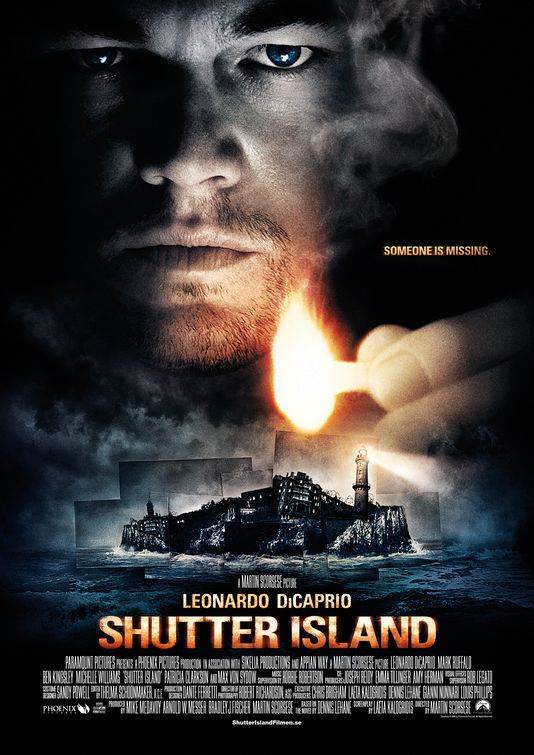Status: In theaters (opened 2/19/10)
Directed By: Martin Scorsese
Written By: Laeta Kalogridis
Cinematographer: Robert Richardson
Starring: Leonardo DiCaprio, Mark Ruffalo, Ben Kingsley
As the story goes, Shutter Island was originally slated to be released this past fall, but Paramount, facing the economic crunch, decided they didn’t have enough budget to mount an Oscar campaign for it, so it was moved back to February of this year. At the risk of being too harsh, I have to say they made the right choice, because that money would’ve been wasted. Awards-worthy it’s not.
That’s not to say that everything about Shutter Island is bad. In fact, it’s an impressive production from top to bottom, helmed by a master director (Martin Scorsese), featuring a great cast of highly-accomplished actors, with excellent production design and beautiful cinematography by Oscar-winner Robert Richardson (who has photographed—among many others—several films by Scorsese, Quentin Tarantino, and Oliver Stone).
This only leaves the screenplay, which is frustrating enough to nearly offset all of the other great aspects of this film. Shutter Island is A Twist Movie, so much so that such a description is its singularly most defining characteristic. I’d go so far as to say that it’s more A Twist Movie than it is A Scorsese Movie, and that, to me, is saying something. Of course, describing that twist would be unfair here, but mentioning it as I have should hopefully be enough to give you an idea of the impact of the Twist in question. It looms over the whole film throughout its opening and middle acts; you feel it coming from the very start, and spend most of this time anticipating its revelation. Then, the third act is devoted to explaining this Twist, in the most verbose manner I can recall since The Number 23, beating it into the ground and exploring it from far more angles than are necessary—or interesting.
It’s a questionable choice of material for Scorsese, but that’s not to say that he doesn’t know what to do with it, as much as something can be done. His style is one approaching that of classical suspense films of the past; in fact, he announces this right off the bat with an opening green-screen shot showing U.S. Marshall Teddy Daniels (Leonardo DiCaprio) and his partner Chuck (Mark Ruffalo) taking a ferry to the titular island, which is very much like an Alcatraz for the insane. It’s obviously on a sound stage, with a Hitchcockian hyper-real quality to the scene, and Scorsese maintains this feel throughout the film. His cast is game as well; DiCaprio and Ruffalo make a perfect pairing for the tale to be told, and they’re counter-pointed by Ben Kingsley as the psychologist who runs the show. All are as good as their reputations and track records would lead you to believe.
The central mystery of the story of Shutter Island involves a missing patient. “Who is 67?” is asked early and often, referring to the would-be additional resident among the island’s 66 patients. You’ll probably know the answer to this question as soon as it’s asked. Then the movie will jerk you around for about 2 hours, raising doubts to cloud your previous certainty. Then it’ll confirm what you knew all along. And then, it spends way too long explaining things for you, and if you’re anything like me, you’ll just be annoyed by the whole endeavor.
Stylistically, this is an intriguing film. Artistically as well. There’s some virtuoso filmmaking at work here (I was particularly impressed by a flashback scene from World War II, shown in a hauntingly long tracking shot). Shutter Island is one of those cases, though, where the whole does not equal the sum of its parts. It’s not all that rare of a phenomenon, unfortunately—if the script is bogus, the most talented filmmakers in the world aren’t going to make a great film out of it, and this is probably one of the most disappointing examples in recent memory of such a situation.





I don’t like to edit posts after the fact (other than to correct typos), but one thing I forgot to mention in the above review is that Shutter Island is very likely a movie that would benefit from repeat viewings. In fact, when it comes out on video, I may try watching the third act first. I suspect that the clues present throughout the first two acts may be more fun to discover with the knowledge of what they’re foreshadowing fresh in your mind.